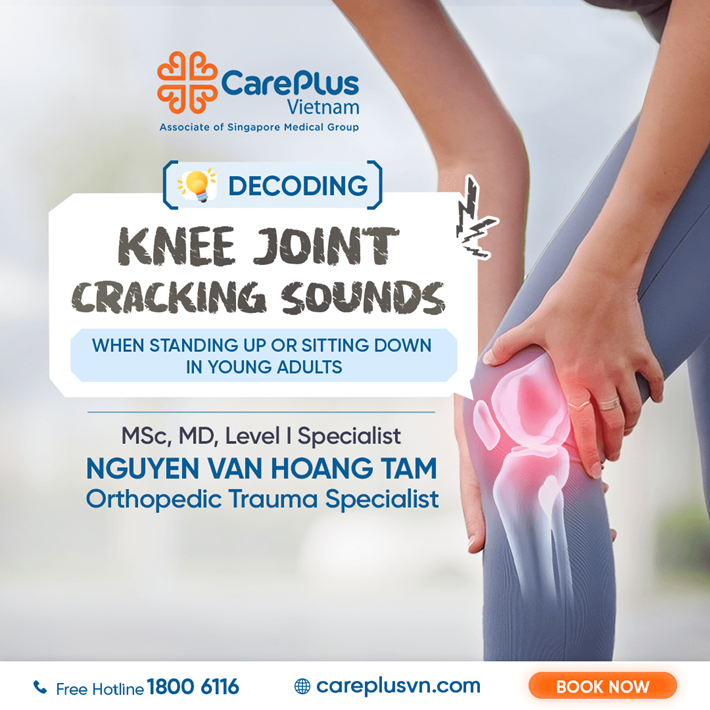DECODING KNEE JOINT CRACKING SOUNDS WHEN STANDING UP OR SITTING DOWN IN YOUNG ADULTS
The “popping” sound from your knee when standing up or sitting down may seem harmless - but it could be an early warning sign of joint issues, especially among sedentary young adults. Let CarePlus help you understand the causes and effective preventive measures in this article.

8/4/2025 11:13:59 AM
This article is medically reviewed by MSc, MD, Level I Specialist Nguyen Van Hoang Tam - Orthopedic Trauma, Sports Medicine, and Musculoskeletal Specialist at CarePlus International Clinics.
⚡ Have you ever been startled by a popping or cracking sound coming from your knee each time you stand up or sit down? While it may seem minor, this phenomenon is becoming increasingly common among young adults aged 20 - 30, particularly students and office workers who spend 6 - 8 hours a day studying or working in a sedentary posture.
👉 Could this be an early sign of an underlying health issue? Let’s explore with CarePlus in the article below.
1️⃣ Why Do Your Knees Make Noises Even When You’re Still Young?
💥 Popping or cracking sounds in the knees are quite common. In many cases, they are caused by harmless physiological reasons such as:
🔸 Gas bubbles: This is the most common and generally harmless cause. Synovial fluid in the joints contains gases like oxygen, nitrogen, and carbon dioxide. When a joint moves suddenly or quickly, pressure changes can create or collapse gas bubbles, producing a cracking or popping sound. This commonly occurs when cracking knuckles, rotating the neck, or when your knees make noise as you stand or sit.
🔸 Ligaments and tendons sliding over bones: As you move, ligaments or tendons may slide over bony structures or protrusions, creating friction or snapping sounds. This is frequently observed in the shoulder (during rotation) and the knee.
In addition to these harmless causes, other factors can contribute to knee popping:
🔹 Natural aging: As we age, joint cartilage loses its elasticity and synovial fluid decreases, making joint noises more noticeable.
🔹 Improper posture or overuse: Repetitive movements performed incorrectly or intense activity without proper technique can strain joints, resulting in popping sounds and potential injury.
🔹 Weak surrounding muscles: Poor muscle support or muscular imbalance can lead to joint instability and increased noise during movement.
🔹 Overweight or obesity: Excess weight increases pressure on weight-bearing joints such as the knees and ankles, accelerating degeneration and causing joint noise.
2️⃣ What Conditions Might Be Behind the “Popping” Sound?
If your joints pop without pain, the issue is often harmless. However, popping accompanied by pain or swelling could signal an injury or underlying disorder:
▪️ Osteoarthritis: A common cause among older adults. As cartilage wears down over time, bones rub more directly against each other, causing creaking or popping sounds along with pain and restricted movement. The noise tends to be more noticeable after periods of rest or during movement.
▪️ Bursitis or Tendonitis: Inflammation of the bursae (fluid-filled sacs) or surrounding tendons can cause swelling, pain, and sometimes noises due to friction during joint movement.
▪️ Meniscus or labrum tears: Injuries or degeneration in the knee meniscus or shoulder labrum may cause fragments of cartilage to become trapped or rub against joint surfaces, producing distinct sounds, locking, or sharp pain.
▪️ Ligament injuries: Partial or complete ligament tears (e.g., ACL in the knee or ankle ligaments) can destabilize the joint, resulting in noise or a loose feeling.
▪️ Subluxation or recurrent dislocation: Partial or repeated dislocation of joints (commonly in the shoulder) may cause audible popping sounds and joint instability.
▪️ Rheumatoid arthritis or other inflammatory joint diseases: These autoimmune conditions cause chronic joint inflammation, leading to cartilage and bone damage, joint deformity, pain, and popping sounds.
▪️ Loose bodies (joint mice): Small pieces of bone or cartilage may break off due to trauma or degeneration and float within the joint. When trapped between surfaces, they can cause popping sounds, joint locking, and pain.
▪️ Past injuries: Even healed injuries can result in structural changes to the joint, which may lead to popping during movement.
▪️ Patellofemoral pain syndrome: Common in the knee, caused by misalignment or muscular imbalance that causes the back of the kneecap to rub against the femur during bending and straightening, leading to grinding sounds and discomfort.
▪️ Pseudoarthrosis (false joint): When a bone fracture fails to heal properly, it may create a false joint that produces noise and pain during movement.
3️⃣ When Should You See a Doctor?
You should seek medical attention if the popping sound in your joints is accompanied by any of the following symptoms:
🔺 Pain: Especially persistent or worsening pain with movement.
🔺 Swelling, warmth, or redness: Signs of inflammation.
🔺 Limited mobility or stiffness: Difficulty bending, straightening, or rotating the joint.
🔺 Joint locking, looseness, or instability: The sensation that the joint might “give out.”
🔺 Noise following trauma: Could indicate serious damage.
🎯 Being proactive about your musculoskeletal health when unusual signs arise helps you better understand your condition, adjust your daily habits in time, and prevent early joint degeneration - especially crucial for young people with sedentary lifestyles.
At CarePlus, our team of experienced Orthopedic and Musculoskeletal Specialists, along with state-of-the-art diagnostic equipment - including MRI and CT imaging enhanced with AI technology - will help you accurately identify your condition and recommend the most appropriate treatment.
📲 Please call our free hotline at 1800 6116 to schedule your appointment today.
CAREPLUS INTERNATIONAL CLINICS
Associate of Singapore Medical Group
Hotline: 1800 6116
Email: info@careplusvn.com
Fanpage: CarePlus Clinic Vietnam